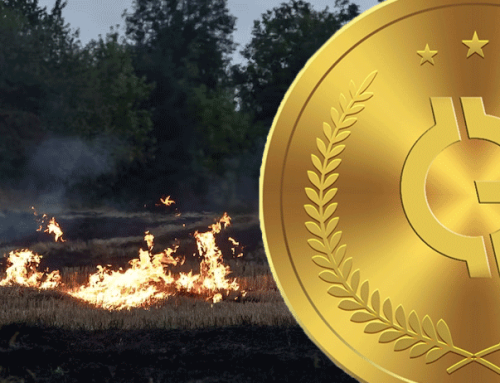Climate change and blockchain technology have been a hot topic for the past couple of years. I believe you have all seen enough headlines about climate change, but do any of you truly understand the current climate situation?
Why We Need to Take Action
To understand the relationship between climate change and blockchain technology, it is crucial for us to acknowledge climate change and realise the ongoing negative impacts. According to the United Nations, climate change is defined as the long-term shifts in temperatures and weather patterns. There are many ways that climate change affects us and below are some of the major consequences of climate inaction.
Rising Temperature
Tons of ice are melted each year due to climate change
Greenhouse gases (GHG) trap the heat from the sun making our planet warmer. In fact, the global temperature has risen 1.1°C from 1901 to 2020. The figure seems insignificant, but the number is already high enough to melt and shrink glaciers at a rapid rate. Alarmingly, 750 billion tons of ice are melting every year.
More Extreme Weather Events
Climate change leads to more extreme weather events
The change in climate also leads to more frequent extreme weather events. Climate disasters shot up by 83% in the past 20 years. Heavy rains, floods and winds destroy infrastructure such as bridges, roads and pipes, forcing governments to shut down major highways and business areas.
Air Pollution: What you Breathe in can be Harmful
Air pollution brought out by climate change kills millions of people worldwide
The world has experienced a sharp increase in GHG production ever since the industrial revolution with the energy industry being the biggest polluters. As a matter of fact, 15.83 billion tons of GHG is produced every year just from energy alone. These toxic gases are potent to humans leading to the rise in respiratory and coronary diseases across the globe. According to WHO, 7 million people die prematurely each year due to air pollution.
What is Blockchain?
Blockchain is defined as a decentralised, distributed and public digital ledger keeping a permanent record of confirmed transactions. Each transaction is stored in a unit known as a block. Whenever there is a new transaction of the same item, a chain would be created to link up with the previous transactions. This forms a chain of data known as blockchain which allows easy tracking and tracing of information. In comparison to a traditional ledger, blockchains guarantee transparency, authority and security. As each transaction is transmitted to globally distributed computers within a peer-to-peer network, blockchain provides decentralisation and authority to individuals. Centralised organisations such as banks store their client’s information in one single computer system while taking full control over it.
This way, data in centralised organisations are prone to alterations whereas data alteration in a blockchain is not as easy since hackers would need to hack into all computers in order to modify the data. What is more, anyone on the chain can view transactions across each blockchain allowing transparent and safe information storage.
How does blockchain works
Top Myths about Blockchain
Blockchain can be a complicated idea to grasp and there are many misconceptions circulating on the internet. I am going to debunk some of them below. Read and see if you are on the right track!
Blockchain = bitcoin?
Blockchains are often associated with bitcoins, but they are 2 completely different concepts. Bitcoin is a type of digital currency whereas blockchain is a ledger that records crypto transactions.
Blockchain is Only Relevant to Finance?
As blockchain is the new hype in finance, many people assume that it only has financial application. In reality, its applications are not limited to finance. Due to its transparent nature, it can also be used for tracking the supply chain. Many pharmaceutical companies including Walmart and Merck utilise the blockchain to trace their supply chain ensuring safe consumption.
Crypto and scam: blockchain is an Incubator of Criminal Activities?
Although there has been a rise in crypto-related crimes ever since the introduction of bitcoin, it is unfair to say that it is a dangerous place with scammers roaming around. It is important to note that blockchain and crypto is a relatively new technology. Therefore, there is a lack of regulations and public education about blockchains and cryptos which provides opportunities for scammers.
Doesn’t Crypto Have High Energy Consumption?
It is no secret that cryptocurrencies can be extremely energy demanding due to the rigorous mining process. The biggest player in the market, Bitcoin, consumes 150 terawatt-hours of electricity per year. This translates to an energy consumption higher than the entire Argentinian population. On the other hand, some tokens on the market utilise the ‘Proof of Stake’ mechanism (PoS) in which people are randomly selected for validations. This eliminates the competition between miners to solve a hash hence less energy is consumed. One of the most well-known examples would be etherium (ETH) which consumes 99% less electricity than bitcoin.
Climate Change Solutions with Blockchain
Supply Chain Management
Have you ever bought anything from a shop that claims to be ‘sustainable’ or ‘fairly traded’ and wondered if that is actually true? Before blockchain was introduced, people simply had to put their faith in the company and hope that their claims were true. Nowadays, both businesses and consumers can simply go onto the digital ledger and search for the product. With just a click, all information would be displayed in front of our eyes. The easy access allows us to ensure that the entire process in the supply chain is sustainable. Startups like Fishcoin makes use of blockchain technology to trace seafood from point of harvest to consumption ensuring safety and sustainability of the seafood source.
Carbon credits
Carbon credits is a certification that permits the holder to emit a ton of GHG. Companies can earn the credits by taking an initiative to offset carbon. Examples include Meta Carbon which specialises in the selling of carbon credits as NFTs and KlimaDao, a cryptocurrency that incentivises corporations and organisations to offset their carbon.
Our Solution
Greens Token aims to drive down the extra cost that you pay for choosing a more sustainable solution, by increasing green demand and supply. We encourage and make sustainable investments in startups that provide sustainable solutions to meet the community’s needs. At the same time, we unite and reward individuals in the sustainability community to incentivise green actions. We believe that sustainable solutions should not be expensive. By driving down the green premium, we hope that more people would be encouraged to make more sustainable decisions.
What are you waiting for? Join our community and together we can build a more sustainable future!




